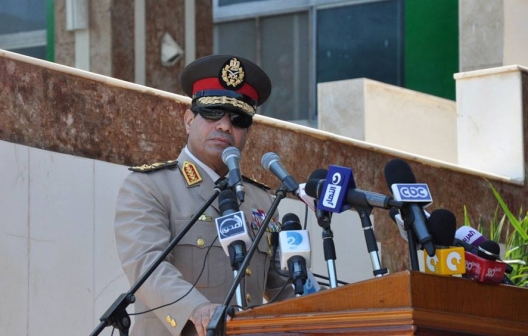 For the first time, with General Abdel Fattah al-Sisi’s call for mass protests on Friday July 26 to “confront terrorism,” the Egyptian military is openly and directly asking Egyptians to rally in a show of support for an impending action. His call indicates that, once again, the balance of power in Egypt has changed; turning the table upside down on the country’s sole organized political force that ruled the political street and reinstalling the military as the country’s superpower that enjoys widespread support among the population.
For the first time, with General Abdel Fattah al-Sisi’s call for mass protests on Friday July 26 to “confront terrorism,” the Egyptian military is openly and directly asking Egyptians to rally in a show of support for an impending action. His call indicates that, once again, the balance of power in Egypt has changed; turning the table upside down on the country’s sole organized political force that ruled the political street and reinstalling the military as the country’s superpower that enjoys widespread support among the population.
For the past two and a half years, the Muslim Brotherhood used its ability to amass tens of thousands in the street, always with politically-motivated aims. Under the rule of the Supreme Council for the Armed Forces (SCAF), the Brotherhood staged various mass demonstrations to coerce the SCAF into acquiescing to their demands, particularly where the drafting of the constitution was concerned. In these demonstrations, they never protested SCAF’s human rights abuses and never chanted “Down with military rule,” alongside the revolutionaries.
After former president Mohamed Morsi’s election, the Brotherhood’s demonstration of street power continued, often sending its followers into the streets to “protect” his decisions. The most significant incident of this kind occurred when the Brotherhood’s cadres surrounded the Supreme Constitutional Court (SCC) preventing the SCC judges from ruling on the legitimacy of the constituent assembly and Shura Council. The protest took place a few hours before Morsi sacked the prosecutor general and replaced him with a Brotherhood sympathizer, an indication that the people were rallying in anticipation of an impending action.
The Brotherhood’s use of mass demonstrations and rallies continued, until June 30 raised the bar. On that day, the street turned against the Brotherhood, in numbers far exceeding anything the Brotherhood ever amassed. In fact, the number of protesters surpassed those participating in the January 2011 revolution. After two and a half years of using the street’s magic, June 30 marked the day when the magic turned on the magician.
When Sisi called on Egyptians to demonstrate on July 26, several Egyptians activists asked a fair question: If Adly Mansour is president, why is Sisi calling on Egyptians to demonstrate? The answer is simple: in post-June 30 Egypt, Sisi controls the streets; he has become the magician. If Mansour had called for these protests, it is doubtful he could fill a quarter of Tahrir. So why did Sisi call for these protests? We can only speculate.
The first speculation could be a simple flexing of muscles. Sisi’s move emulates Brotherhood tactics from the past two and half years: use the streets to show who has the clear backing of the majority. The Brotherhood held a series of demonstrations after Morsi’s ouster calling for his reinstatement. The continued mobilization of the pro-Morsi camp may well be the reason Sisi called for the July 26 demonstrations. Sisi’s move attempts to drive home the point that the street, which the Brotherhood has long claimed to control, has now swayed over to the army. An inevitable comparison will be made between both camps, as each jostles for the mantle of the biggest protest, and Sisi likely knows that in a numbers game, he will come out on top.
Second, Sisi might use the July 26 mandate to carry out certain policies, the nature of which remains unknown. In his speech, Sisi asked for the people’s support to “fight terrorism.” If the past thirteen years taught us anything, it is how broad this statement is. Fighting terrorism might range from a full scale war against jihadists in the Sinai-which the army does not need a mandate for-to a harsh crackdown on the Brotherhood. The latter could range from the continued imprisonment of Brotherhood leaders until they surrender to reality, or it could hint at a wider crackdown on the entire Brotherhood network, a la Gamel Abdel Nasser in the 1950s. The fact that the military gave the Brotherhood yet another forty-eight hour ultimatum, this time to come to the negotiations table, reinforces the notion that an impending crackdown looms.
Sisi’s call and the drama that might unfold afterwards is another reminder that Egypt is still seesawing between the Islamists and the army. The revolution has still failed to provide a viable third alternative that would finally break that seesaw.
The Big Pharaoh is an Egyptian blogger since 2004. He writes on Egypt affairs and the Middle East in general. He is active on twitter @thebigpharaoh and on his blog www.bigpharaoh.org
Image: General Abdel Fattah al-Sisi (photo: Egypt Army Facebook)
